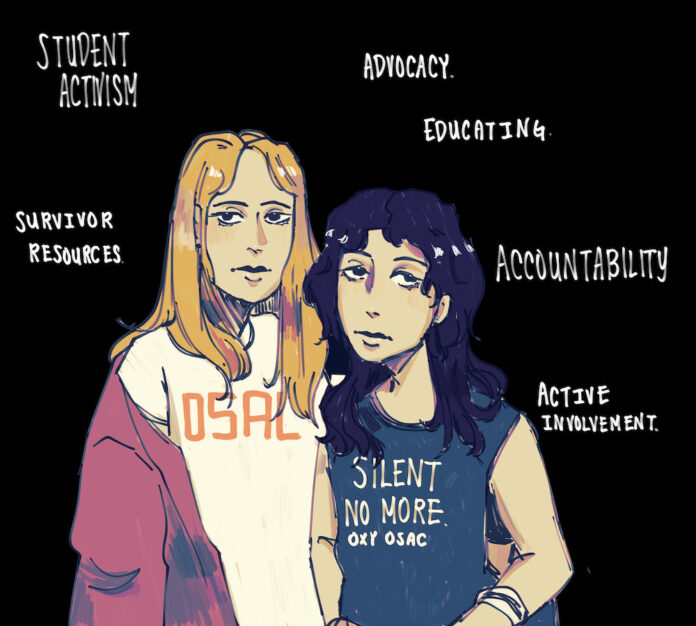Following a period of dormancy, Oxy Sexual Assault Coalition (OSAC) — a student-run coalition that aims to support students and survivors — announced their re-emergence as an active student organization via campus-wide email Nov. 30, 2017. Since their 2017 return, OSAC members have continued work toward their mission to provide educational resources to students and advocate for college policy changes that promote fairness and safety during the remote semesters.
While OSAC was active at Occidental from 2007–2013, it was inactive 2013–2017. Avanti Puri (senior) said when OSAC initially re-emerged, they only had two or three members — they now have 11. Puri said she now has a president-like role with OSAC, and she plans meetings and communicates with their contacts: students, administrators and advocates. OSAC’s unregistered status influences the way they operate on campus, according to Puri.
“So much would be lost [if OSAC did not return],” Puri said. “Our impact as an unregistered organization allows us to push back the administration in ways that registered organizations can’t because of censorship, funding, institutionalization and fear.”
OSAC filed an 80-page federal complaint March 2013 alleging that Occidental violated legal requirements to disclose crimes to the campus community. Occidental said in its 2013 Annual Fire, Safety, and Security Report that they failed to include 19 reports of sexual misconduct from 2007–2010 in their Clery reports. The college ultimately faced $83,000 in fines after they were found guilty of the violation.
According to Puri, OSAC recently developed a new Community Advisory Board, which was a meaningful step in their development as a coalition. Puri said the board started last semester, and the eight board members are involved with work related to activism, advocacy and sexual assault prevention. The board members support OSAC’s needs — which might include funding or networking — and OSAC members also ask how they can aid the board members with their work, according to Puri.
One board member is Stef Lynch, a community organizer for Planned Parenthood Advocates Pasadena and San Gabriel Valley.
“I continue to be floored by the amazing amount of engagement and self-awareness that Oxy students have,” Lynch said. “They are just so thoughtful and well-spoken people who are just really trying to make a difference.”
Puri said the coalition is currently busy working to address changes in residential education and new student orientations, and OSAC is also interested in the intersection of restorative justice and sexual assault prevention.
A goal in OSAC’s 2020–2021 mission statement is to ban underground Greek organizations at Occidental. Puri said this was a goal for OSAC because Greek organizations have had past problems with sexual violence and are not required to go through certain Greek bylaw trainings. They are required to go through Project SAFE and Title IX training, but that training is not specific to the culture of Greek Life, according to Puri.
“[Sexual violence] is much more prevalent than a lot of people think it is; there is someone in your life that has experienced some form of sexual violence or harassment whether or not you know it,” Puri said.
Caroline Diamond (junior) said it is essential to remember that the topic of violence is relevant regardless of whether students are on campus, so OSAC’s work has remained important during the remote semesters.
“You could be at home in your house where something happened to you, or you are with your parents, and maybe they don’t believe you,” Diamond said. “So a lot of our work has shifted to providing more spaces for survivors.”
Those spaces have included an anonymous feedback form, a community space where people can voice concerns and also a recurring self-care night, according to Diamond.
“OSAC has been an avenue for my work surrounding justice and survivorship at Occidental, and it is a space where I feel comfortable telling my story, expressing myself and saying my beliefs,” Diamond said. “That’s really powerful and that’s something I would be missing if I wasn’t in OSAC.”
Diamond said she is excited that OSAC seems more stable and sustainable now than when she first joined the coalition two years ago.
“Having 11 members means that our bandwidth as an organization is so much larger, and with that, we can do more supportive programming for students and expand our communication reach,” Diamond said. “That gives me hope that OSAC isn’t just going to die out when Avanti [Puri] graduates or when I graduate.”
OSAC member Eleanor Alvarez (junior) said that before she applied to colleges, she watched “The Hunting Ground,” a documentary that features institutions that have allegedly mishandled sexual assault cases, in which Occidental is featured.
“I’m not a survivor of sexual assault, but I think that my whole life has been impacted by sexual violence directly or indirectly, and sexual assault is the most extreme case of sexual violence,” Alvarez said. “I felt if I could do something to help out or support something like OSAC, then I’d want to.”
Oxy 24/7 Confidential Hotline: (323) 341-4141 Survivor Advocate: (323) 259-1359
This article was updated at 11:13 a.m. April 21, 2021 to correct the name of Oxy Sexual Assault Coalition from Occidental Sexual Assault Coalition.
![]()































